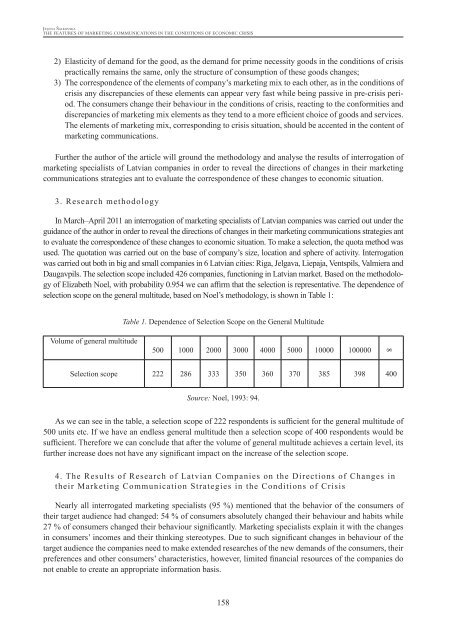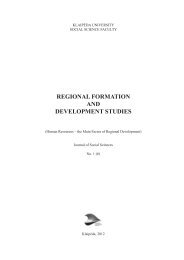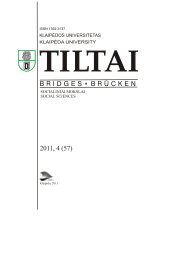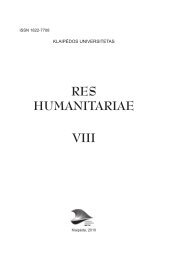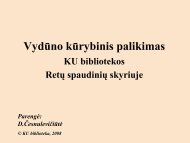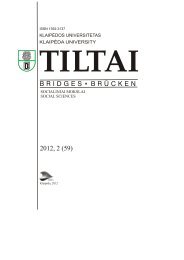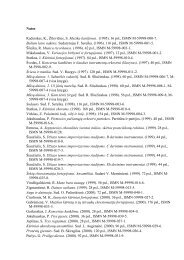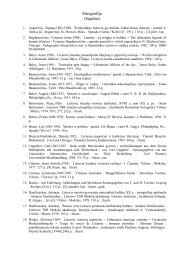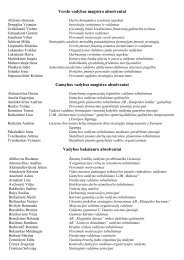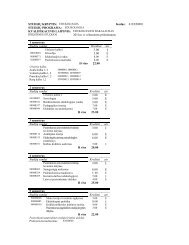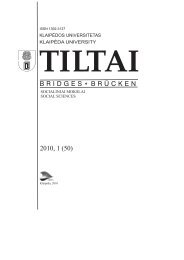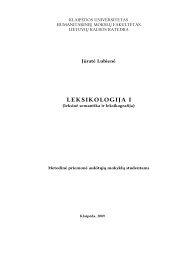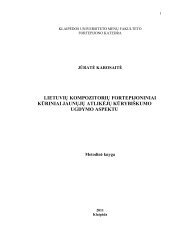regional formation and development studies - KlaipÄdos universitetas
regional formation and development studies - KlaipÄdos universitetas
regional formation and development studies - KlaipÄdos universitetas
You also want an ePaper? Increase the reach of your titles
YUMPU automatically turns print PDFs into web optimized ePapers that Google loves.
Jeļena Šalkovska<br />
THE FEATURES OF MARKETING COMMUNICATIONS IN THE CONDITIONS OF ECONOMIC CRISIS<br />
2) Elasticity of dem<strong>and</strong> for the good, as the dem<strong>and</strong> for prime necessity goods in the conditions of crisis<br />
practically remains the same, only the structure of consumption of these goods changes;<br />
3) The correspondence of the elements of company’s marketing mix to each other, as in the conditions of<br />
crisis any discrepancies of these elements can appear very fast while being passive in pre-crisis period.<br />
The consumers change their behaviour in the conditions of crisis, reacting to the conformities <strong>and</strong><br />
discrepancies of marketing mix elements as they tend to a more efficient choice of goods <strong>and</strong> services.<br />
The elements of marketing mix, corresponding to crisis situation, should be accented in the content of<br />
marketing communications.<br />
Further the author of the article will ground the methodology <strong>and</strong> analyse the results of interrogation of<br />
marketing specialists of Latvian companies in order to reveal the directions of changes in their marketing<br />
communications strategies ant to evaluate the correspondence of these changes to economic situation.<br />
3. Research methodology<br />
In March–April 2011 an interrogation of marketing specialists of Latvian companies was carried out under the<br />
guidance of the author in order to reveal the directions of changes in their marketing communications strategies ant<br />
to evaluate the correspondence of these changes to economic situation. To make a selection, the quota method was<br />
used. The quotation was carried out on the base of company’s size, location <strong>and</strong> sphere of activity. Interrogation<br />
was carried out both in big <strong>and</strong> small companies in 6 Latvian cities: Riga, Jelgava, Liepaja, Ventspils, Valmiera <strong>and</strong><br />
Daugavpils. The selection scope included 426 companies, functioning in Latvian market. Based on the methodology<br />
of Elizabeth Noel, with probability 0.954 we can affirm that the selection is representative. The dependence of<br />
selection scope on the general multitude, based on Noel’s methodology, is shown in Table 1:<br />
Table 1. Dependence of Selection Scope on the General Multitude<br />
Volume of general multitude<br />
500 1000 2000 3000 4000 5000 10000 100000<br />
8<br />
Selection scope 222 286 333 350 360 370 385 398 400<br />
Source: Noel, 1993: 94.<br />
As we can see in the table, a selection scope of 222 respondents is sufficient for the general multitude of<br />
500 units etc. If we have an endless general multitude then a selection scope of 400 respondents would be<br />
sufficient. Therefore we can conclude that after the volume of general multitude achieves a certain level, its<br />
further increase does not have any significant impact on the increase of the selection scope.<br />
4. The Results of Research of Latvian Companies on the Directions of Changes in<br />
their Marketing Communication Strategies in the Conditions of Crisis<br />
Nearly all interrogated marketing specialists (95 %) mentioned that the behavior of the consumers of<br />
their target audience had changed: 54 % of consumers absolutely changed their behaviour <strong>and</strong> habits while<br />
27 % of consumers changed their behaviour significantly. Marketing specialists explain it with the changes<br />
in consumers’ incomes <strong>and</strong> their thinking stereotypes. Due to such significant changes in behaviour of the<br />
target audience the companies need to make extended researches of the new dem<strong>and</strong>s of the consumers, their<br />
preferences <strong>and</strong> other consumers’ characteristics, however, limited financial resources of the companies do<br />
not enable to create an appropriate in<strong>formation</strong> basis.<br />
158


